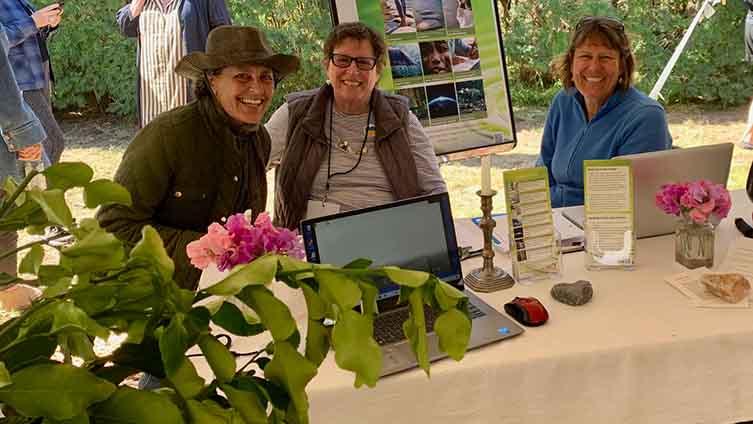Transforming the Way Prisoners Die
October 1, 2022
Humane Prison Hospice Project
by Lisa Deal, Executive Director, Humane Prison Hospice Project
Humane Prison Hospice Project's goal is to transform the way prisoners die in the United States: offering education, advocacy, and programming to train incarcerated peers in compassionate end-of-life caregiving and grief companionship.
This year, we are so pleased to have established new strategic partnerships, worked to raise stakeholder awareness, and gratefully accepted some incredible new funding that will help lay the groundwork for Humane to increase impact and further its core mission for years to come.

Establishing Strategic Partnerships
This past year, we had the tremendous opportunity to partner directly with the California Department of Corrections and Rehabilitation (CDCR) and AMEND, a public health-focused program at University of California San Francisco dedicated to changing the culture within correctional settings.
Through this partnership, we will expand and deepen our training program, implementing our compassionate end-of-life caregiver model as part of a broader effort to develop prison-based palliative care and hospice programs statewide. Presently, Humane—in partnership with Dr. Michele DiTomas, Chief Executive of Palliative Care within CDCR and her team—is creating an evidence-based palliative care worker training curriculum. The curriculum incorporates best practices from the Brothers’ Keepers Peer Support Program that Humane has led at San Quentin since 2017, existing curriculum that has been developed and used by our staff to train hospice volunteers in the community over the past 20 years, and material used to train peer hospice volunteers at California Medical Facility, home of the only prison hospice program in the state.
Humane plans to begin piloting the new curriculum this winter at both the Central California Women’s Facility and San Quentin. This will be the first step toward long-term plans to expand Humane’s peer support palliative care training to additional facilities in California’s 33-prison system and to promote the use of this training model in other states that have demonstrated interest in this model.
This strategic partnership comes at a critical time when suffering behind bars during COVID has been acute. It is an opportunity to make our vision of compassionate palliative and end-of-life care for all people in California’s prison system a reality. Humane’s unique role in training and supporting peer caregivers to be part of a broader healthcare team to deliver quality care for those with life-limiting illness in our prisons is critical.
Our partnership is also a unique opportunity for collaboration among the public state-run system (CDCR), our community-based organization, and an academic research group (AMEND) to work together to improve health outcomes for one of our most vulnerable populations. Lessons learned from this endeavor could be a model for future efforts to improve the delivery of care in the prison system in other ways as well.
Educating Stakeholders
To help promote a social movement that advocates for just treatment of prisoners, especially at the end-of-life, Humane works to raise stakeholder awareness and increase education about the needs of the aging and dying in prison, an important step toward the adoption and replication of prison hospice programs.
The advancing virtual environment the world has adjusted to during the past couple of years, along with funding to bring on an outreach and events manager, has provided Humane with numerous opportunities to present to a variety of stakeholders nationwide, including policy advocates, students, health care professionals, hospice executives, and prison staff.
Through in-person and virtual offerings, Humane’s reach has expanded significantly during the past year, and has touched more than 21 organizations that reached more than 1,300 interested stakeholders and potential advocates. Each of these events included a showing of the moving Academy Award-nominated documentary film, Prison Terminal, and followed by a panel discussion with the Humane team.

Feedback from these events has been overwhelmingly positive, resulting in hundreds of people nationwide subscribing to Humane’s mailing list, more than $100,000 from individual donors, the engagement of several skilled volunteers, and dozens of people inquiring how they could help to promote prison hospice programs in their own states and communities.
A Growing Funding Base
The Humane team recognizes that, to become a more established and stable organization, more funding and a more diversified funding base is needed for long-term sustainability and growth. Thus, we have worked diligently this past year to both solidify new institutional funders and to cultivate more committed individual donors.
Because of Humane’s progress toward advancing its mission—seed funding offered by an anonymous donor through the Tides Foundation in 2019—was extended with a new gift of $250,000. This impactful donation, along with a 3-year grant from The Dune Road Foundation, will meaningfully help support Humane’s program development and implementation and organizational growth during the coming year.
In addition to these generous donors, Humane cultivated and secured three additional institutional funding partners to support direct program, education, and advocacy work: the John and Wauna Harman Foundation, INELDA, and Compassion & Choices. Together, these funders committed nearly $120,000 and provided valuable strategic input.
Summary
Today, the United States has the highest incarceration rate in the world, with more than 2 million people living behind bars. This population is rapidly aging, reaching crisis numbers. Because of tough sentencing laws during the past several decades, the “elderly”—typically defined as those over age 55 because prison physiologically ages people at a faster rate—are expected to account for one-third of the prison population by 2030. This statistic sets U.S. prisons up to essentially become nursing homes for the ill, the frail, and the dying in the decades to come. The expense of caring for an aging person who is incarcerated can cost up to five times that of caring for a younger incarcerated person, thus threatening to collapse an already deficit system.
With this graying of the prison population, the need for more compassionate and effective end-of-life care is acute. No human being, not even those behind prison walls, deserves to die alone without comfort and appropriate care, much less alone in a prison cell or shackled to a hospital bed and left to die.
Humane’s model of training prisoners in compassionate end-of-life care and grief companionship is transformational—not only for the prisoner receiving the care, but also for the prison correctional staff who witness this incredible act of humanity, and for the trained prison caregiver, who may for the first time in their life have the opportunity to extend compassion, empathy, and grace to another human.
***
Find out more about the work HPHP is doing on their website.





















